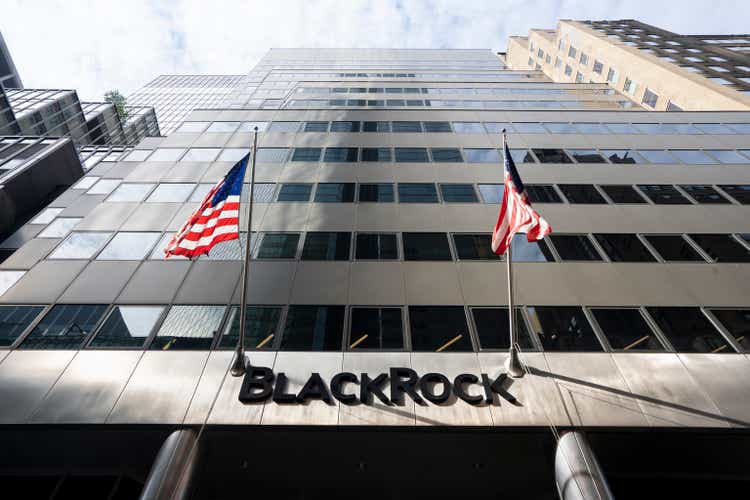UniCredit & BlackRock Bitcoin ETF Partnership
A significant transformation is unfolding within the global financial landscape, marked by a powerful convergence between established banking institutions and the rapidly expanding cryptocurrency market. This pivotal shift is exemplified by UniCredit, Italy's second-largest bank, which has made a groundbreaking announcement: its intention to provide a BlackRock Bitcoin ETF-linked product to its exclusive clientele. This strategic move is not merely an isolated event but a substantial development poised to redefine how institutional capital engages with digital assets, paving the way for sophisticated cryptocurrency investments and fostering broader market acceptance.
For many years, traditional financial entities have approached the volatile realm of cryptocurrencies with considerable apprehension, primarily due to regulatory uncertainties and inherent market risks. However, the financial ecosystem is undergoing rapid evolution, and UniCredit's decision marks a critical juncture. By offering a product directly tied to a BlackRock Bitcoin ETF, UniCredit is making a clear and decisive statement regarding the increasing legitimacy and robust demand for digital assets among its high-net-worth individuals and institutional investors. This initiative strategically positions UniCredit at the vanguard of financial innovation in Europe. It enables the bank to effectively address the evolving requirements of its clients, who are increasingly seeking exposure to Bitcoin without the complexities associated with direct ownership or the management of digital wallets. This move could potentially serve as a foundational blueprint for other prominent European banks considering their entry into the crypto sector, potentially triggering a cascading effect across the continent.
The initial offering is specifically tailored for "select clients," indicating a methodical, phased implementation. This approach prioritizes high-net-worth individuals and institutional investors, who typically possess greater familiarity with intricate financial products and exhibit a higher tolerance for risk. This controlled rollout provides UniCredit with the opportunity to refine its operational processes, meticulously manage regulatory compliance, and gather invaluable feedback before potentially extending the service to a broader client base.
The collaboration with BlackRock is an indispensable component of UniCredit's groundbreaking announcement. BlackRock, recognized globally as the largest asset manager, has maintained a dominant presence in the ETF market for several decades. Their recent venture into the spot Bitcoin ETF arena with the iShares Bitcoin Trust (IBIT) has been exceptionally successful, attracting billions in capital inflows since its inception. The resounding success of IBIT has unequivocally validated the immense institutional and retail demand for regulated and accessible Bitcoin exposure. BlackRock's involvement imbues UniCredit's offering with an unparalleled level of credibility and robust infrastructure. Investors gain indirect exposure to Bitcoin through a product managed by a globally recognized and highly trusted asset manager, thereby mitigating some of the perceived risks commonly associated with the nascent cryptocurrency market. This collaboration underscores a growing trend wherein established financial behemoths leverage each other's distinct strengths to bridge the divide between traditional finance and the emerging digital asset economy. For BlackRock, this partnership with UniCredit represents a significant expansion of its global footprint and influence within the digital asset sector. It enables BlackRock to access a new pool of European investors via an established banking network, further solidifying its position as a key orchestrator in the institutional adoption of cryptocurrencies.
Financial institutions and their clients are increasingly drawn to Bitcoin ETF-linked products due to a compelling combination of accessibility, regulatory clarity, and seamless integration into existing investment portfolios. Unlike direct Bitcoin ownership, which often necessitates navigating complex cryptocurrency exchanges, understanding self-custody solutions, and meticulously managing private keys, an ETF-linked product dramatically simplifies the entire process. Key advantages for investors include simplified access, allowing them to gain Bitcoin exposure through their existing brokerage accounts with UniCredit, thus eliminating the need for new crypto exchange accounts. Regulatory comfort is enhanced as the product's link to a regulated BlackRock ETF provides a layer of assurance regarding compliance and oversight, which is highly sought after by traditional investors. Furthermore, investors are absolved from the concerns of Bitcoin security and custody, as these aspects are managed by the ETF provider (BlackRock) and its custodians. These products also offer seamless portfolio integration, fitting easily into diversified investment portfolios alongside conventional assets like stocks, bonds, and mutual funds, thereby streamlining asset allocation. Lastly, ETFs generally offer high liquidity, facilitating easy buying and selling during market hours. While the precise structure of UniCredit’s "ETF-linked product" may vary (it could manifest as a certificate, a structured note, or another derivative instrument designed to track the ETF’s performance), the fundamental benefit remains consistent: providing a regulated, convenient, and familiar avenue for clients to gain exposure to Bitcoin.
UniCredit’s proactive step is not an isolated incident but rather a strong indicator of a broader, accelerating trend towards institutional adoption of cryptocurrencies. Over recent years, a steady increase has been observed in traditional financial players—ranging from hedge funds to pension funds and corporate treasuries—allocating portions of their portfolios to digital assets. This trend is propelled by several key factors: cryptocurrencies, particularly Bitcoin, offer low correlation with traditional asset classes, providing potential diversification benefits and enhancing overall portfolio resilience. In an era marked by rising inflation concerns, Bitcoin’s finite supply is increasingly viewed by some as a potential hedge against currency debasement. Digital assets represent an entirely novel asset class, possessing unique characteristics and significant growth potential, thereby attracting forward-thinking investors. Moreover, as both retail and institutional clients demonstrate increased awareness and interest in cryptocurrencies, financial institutions are compelled to offer relevant products to retain existing business and attract new clientele. Finally, the recent approval of spot Bitcoin ETFs in the U.S., alongside ongoing global regulatory developments, is providing greater clarity and fostering increased confidence for institutions to enter this evolving space. This escalating institutional involvement is crucial for the long-term maturation of the crypto market, as it introduces greater liquidity, contributes to reduced volatility over time, and significantly enhances the overall legitimacy of digital assets in the perception of mainstream finance and the general public. The entrance of influential players such as UniCredit and BlackRock signifies a critical stride towards Bitcoin becoming a widely accepted and seamlessly integrated component of global financial portfolios.
The UniCredit-BlackRock collaboration establishes a powerful precedent, particularly within the European market. It conveys a clear message that major banking institutions are no longer content with merely observing the crypto revolution from the sidelines. Instead, they are actively pursuing avenues to participate and address the escalating demand for digital asset exposure. Potential implications of this trend include increased competition among other European banks, who will likely face pressure to either develop their own crypto-linked products or forge partnerships with existing market players. This environment could also foster significant product innovation, potentially leading to the proliferation of more sophisticated crypto investment products, including derivatives, structured products, or even instruments linked to other major cryptocurrencies like Ethereum. Furthermore, as more institutions enter the space, there will be heightened pressure on regulators to establish clear and consistent frameworks, which could further accelerate adoption. Each instance where a major bank offers a cryptocurrency product chips away at the perception of crypto as a niche or purely speculative asset, gradually moving it closer to mainstream financial acceptance. For investors, this trend translates into more choices and potentially more secure, regulated pathways to gain exposure to the digital asset market. However, it is crucial to emphasize the importance of due diligence. Even with institutional backing, cryptocurrency investments inherently carry risks due to market volatility and an evolving regulatory landscape. Investors must always possess a thorough understanding of the underlying assets, the specific structure of the product, and their personal risk tolerance before making any investment decisions.
UniCredit’s decision to offer a BlackRock Bitcoin ETF-linked product transcends the introduction of a new financial service; it stands as a profound symbol of the ongoing convergence between traditional finance and the digital asset economy. This move unequivocally underscores the undeniable demand for regulated cryptocurrency exposure, validates Bitcoin’s burgeoning role as a legitimate asset class, and highlights the proactive measures major institutions are undertaking to adapt to this new financial paradigm. As the distinctions between traditional and decentralized finance continue to blur, initiatives spearheaded by entities like UniCredit and BlackRock are actively paving the way for a more integrated, accessible, and potentially transformative future for global investment.








